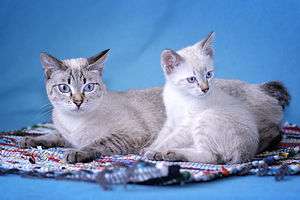Natural bobtail
A natural bobtail is an animal's tail which due to a mutated gene grows unusually short or is missing completely. The genes for the shortened tail may be dominant or recessive.
Due to legislation restricting or preventing docking, natural bobtails are growing in importance in the hobby of dog fancying for some traditionally docked breeds. For example, one Boxer breeder and geneticist in England has successfully petitioned the Kennel Club for permission to cross Corgis into his lines and then backcross to Boxers, introducing the gene into his lines.[1] This would have been unheard of in decades past. A number of these bobtail Boxers have been successfully exported to various countries around the world.
Animals with a natural bobtail
Cats

- American Bobtail
- Cymric cat
- Highlander cat
- Japanese Bobtail
- Karelian Bobtail[2]
- Kurilian Bobtail
- Manx, and Cymric or Manx Longhair
- Mekong Bobtail,[3] a variant of the Siamese
- Pixie-bob
Dogs
A mutation in a gene called the T-box transcription factor T gene (C189G) accounts for natural bobtails in 17 of 23 dog breeds studied, but not in another 6 dog breeds, for which the genetic mechanism is yet to be determined.[4]
Natural bobtail dog breeds with C189G mutation:
- Australian Shepherd
- Austrian Pinscher
- Australian Stumpy Tail Cattle Dog
- Braque du Bourbonnais
- Brazilian Terrier
- Brittany Spaniel
- Croatian Sheepdog
- Catahoula bulldog
- Danish Swedish Farmdog
- Jack Russell Terrier
- Karelian Bear Dog
- Mudi
- Polish Lowland Sheepdog
- Pyrenean Shepherd
- Braque Francais aka Savoy Sheepdog
- Schipperke
- Spanish Water Dog
- Swedish Vallhund
- Pembroke Welsh Corgi
Natural bobtail dog breeds without C189G mutation:
- Boston Terrier
- English Bulldog
- King Charles Spaniel
- Miniature Schnauzer
- Parson Russell Terrier
- Rottweiler
Dog breeds into which the C189G mutation has been introduced by cross-breeding:
Dog breeds where natural bobtails have not yet been tested for C189G mutation:
References
- ↑ The Fantastic Account of Dr Bruce Cattanach’s Bobtail Boxers Virginia Zurflieh, boxerunderground.com, Oct 1998.
- ↑ http://www.wcf-online.de/WCF-EN/standard/semi-longhair/karelian-bobtail.html
- ↑ http://www.wcf-online.de/WCF-EN/standard/siam/mekong-bobtail.html
- ↑ Hytönen et al (2008), "Ancestral T-Box mutation is present in many, but not all, short-tailed dog breeds", Journal of Heredity, Advance Access published online on October 14, 2008, doi:10.1093/jhered/esn085
External links
- Series of Bobtail Boxer articles by Dr. Bruce Cattanach - The only website owned and updated by Dr. Bruce Cattanach
- The Boxer Club of New South Wales, Australia